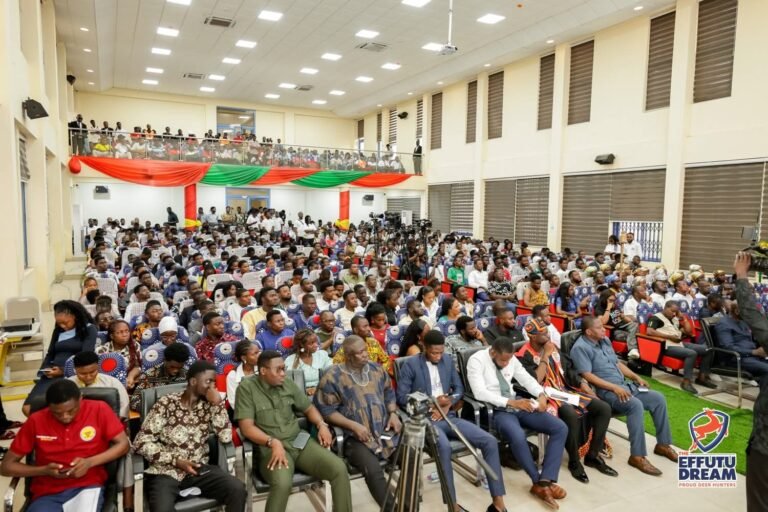
Dr. Elsie Addo Awadzi, Second BoG Governor, reads the speech for the Governo
The Governor of the Bank of Ghana (BoG), Ernest Addison, has said that the promotion of a resilient and thriving agricultural and agribusiness sector should not be taken for granted.
This is because of its broader implications on the economy, including price stability, and helping to stabilise the cedi through reduced food imports and generation of export revenues from the sector, he explained.
He made the call in a speech read for him during the launch of the Ghana Incentive-Based Risk Sharing System for Agricultural Lending’s (GIRSAL) Agriculture Stakeholder Convening and Advocacy platform in Accra.
He said the platform had come at an opportune time, given current discussions on the food production value chain and the potential role it can play to contain the current rise in inflation.
“I believe we all agree that the agricultural sector plays a crucial role in price stability, due to the weight of food in the consumer price basket. Since May 2021, the inflation data have pointed to a gradual increase in food prices, and this trend has intensified in recent months on the back of the recent Russian-Ukraine crises,” he said.
“Food inflation now stands at 30.1 percent in May 2022, significantly up from 5.4 percent in May 2021. Indeed, further insights into the data reveal a faster acceleration of food inflation, relative to non-food inflation. Thus, the inability to address food supply conditions could in the long run jeopardize the Bank’s mandate of price stability. It is within this context that I find this platform useful,” he added.
BoG’s role
Dr. Addison also disclosed that having recognised the important role of the agricultural sector in the economy, his outfit was instrumental in the initiation, design, and establishment of GIRSAL and continues to support the scheme in various ways.
“Between 2014 and 2016, BoG, in collaboration with the Ministry of Finance, Ministry of Food and Agriculture, Ministry of Trade, and other stakeholders set out to find innovative ways to shore up Ghana’s exports and foreign exchange resources through agriculture and agribusinesses,” he said.
“Among the solutions, was for the financial sector, through BoG, to reduce the cost of financing by commercial banks in the agricultural sector. Through joint efforts, and with the support of technical partners such as the Alliance for a Green Revolution in Africa (AGRA), GIRSAL was to establish a Credit Guarantee (CRG) scheme to leverage lending for agriculture and agribusiness through a risk-sharing scheme,” Dr. Addison added.
The BoG Governor pledged the commitment of his outfit to support GIRSAL’s activities.
“We expect that through the AG Platform, GIRSAL would continue to drive the policy discourse and develop innovative solutions to boost productivity and growth in the agricultural sector. This should ultimately improve food supply conditions and help lower inflation. We are confident in the operations of GIRSAL and its long-term viability and we wish GIRSAL well in the years ahead,” Dr. Addison said.
About GIRSAL
GIRSAL was designed to be a holistic and integrated system of instruments designed to de-risk the agricultural sector and incentivise banks to lend to the sector to drive agribusiness development and reduce capital constraints that limit competitiveness.
At the onset, BoG provided GHC200 million seed capital and GHC10 million for the set-up and operational expenses to GIRSAL.
However, in June 2018, BoG transferred its equity interest in GIRSAL Limited to the Government (Ministry of Finance) but continued to support the initiative in many ways.
These include the approval of a zero-risk weighting of credit exposures covered by GIRSAL’s Credit Guarantee Scheme, which demonstrates the confidence the central bank assigns to GIRSAL’s CRG scheme, thus, improving its credibility and attractiveness to financial institutions.
Additionally, BoG partnered with GIRSAL’s Technical Assistance Facility to develop and deliver agriculture and agribusiness finance training to financial institutions’ staff and management, with support from AGRA.
So far, 265 staff from 24 institutions have completed this programme at the National Banking College, with plans for an extension to more institutions. BoG also supports GIRSAL with banking sector data, alongside its supervision and regulation of GIRSAL’s activities.
The newly created AG Platform is expected to provide stakeholders the avenue to identify key bottlenecks in the agriculture and agribusiness value chain, stimulate discussions, and identify possible solutions to unlock the true potential of the agric industry.




